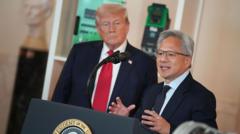What Does the US Cut on Chip Sales to China Mean for the Tech Industry?

Unusual Quid Pro Quo: The Tech Giants’ Deal with the US Government
The recent announcement that two of the world’s leading technology firms, Nvidia and AMD, will remit 15% of their revenue from certain advanced chip sales to China has stirred a pot of mixed reactions. Industry experts, former government advisers, and trade analysts have chimed in, labeling the arrangement as unprecedented and raising concerns about its implications. This agreement follows closely on the heels of a ban from the Trump administration that prohibited the sale of these advanced chips to China due to national security reasons. Now, the US government seems to be taking an active role in the business dealings of American firms with China.
As the AI revolution unfolds, the timing of this arrangement could not be more critical. With investors eagerly betting on the transformative potential of artificial intelligence, firms like Nvidia have soared to unprecedented market valuations. Just last month, Nvidia became the first company to achieve a staggering $4 trillion market cap. This article dives deeper into the implications of this deal, the motivations behind it, and what it could mean for the future of technology and trade between the US and China.
The Background of the Chip Ban and Its Reversal
The backdrop to this current deal is a complex tapestry of trade policies and national security concerns. Under the previous Trump administration, sales of advanced chips to China were outright banned, a move that stemmed from fears that such technology could bolster China’s military capabilities and technological advancements. In mid-July, however, the Biden administration lifted these restrictions, allowing American companies to re-enter this lucrative market.
The chips in question, specifically developed for the Chinese market, include Nvidia’s H20 and AMD’s MI308. These chips, while less powerful than their flagship counterparts, provide a critical entry point into a vast market where demand for AI technology is surging. Analysts predict that China’s investment in AI could reach around $100 billion this year, marking a near 50% increase compared to the previous year.
The Economic Implications of the Deal
While the deal is undoubtedly beneficial for Nvidia and AMD in terms of accessing the significant Chinese market, the 15% cut from their revenue raises questions about the future profitability of these firms. The expectation is that sales to China will provide substantial earnings, yet the imposed tax could dampen investor sentiment. Chip manufacturers typically plan their operations years in advance, and such uncertainty could significantly impact their financial projections.
This new arrangement has provoked concerns about how it might affect other US companies that consider China a vital market. Will they also have to share a portion of their profits with the US government? The implications of this deal could extend beyond just Nvidia and AMD, influencing how corporations across various sectors approach their business dealings with China.
National Security Concerns and Lobbying Efforts
National security remains a pivotal concern in this discussion. Critics argue that selling AI chips to China could arm Beijing with capabilities that may not only enhance their technological prowess but also their military applications. Despite these concerns, some experts believe that restricting chip sales only serves to fuel Chinese innovation and competition. They argue that it’s more beneficial for the US to maintain a foothold in the Chinese tech ecosystem, rather than pushing it away.
The decision to allow chip sales to China may have been influenced by intense lobbying efforts from Nvidia’s CEO, Jensen Huang. His meeting with Trump prior to the agreement suggests a strategic push to facilitate this deal, which some perceive as a compromise to secure favorable conditions for US tech firms in a competitive global landscape.
Potential Gains for the US Government
From a governmental perspective, the arrangement could yield substantial financial returns. Analysts estimate that the US could potentially earn up to $2 billion from chip sales to China. This revenue could be crucial for funding various initiatives and reinforcing the US’s position in the global tech market.
Moreover, there could be additional strategic advantages for the US. The revenue generated from these chip sales might pave the way for negotiations regarding rare-earth elements, a sector where China currently holds a monopoly. By leveraging chip exports, the US may negotiate better terms for access to these critical minerals, which are essential for various high-tech applications.
What This Means for the Future of US-China Relations
This unprecedented move signals a shift in the US's approach to trade and technology relationships with China. As the landscape evolves, it raises questions about what other industries may face similar arrangements in the future. The flexibility demonstrated by the current administration has raised eyebrows and created a new dynamic in US-China relations.
Concerns and Criticism
Despite the potential benefits, many critics remain vocal about their apprehensions regarding this deal. Trade expert Deborah Elms expressed her concern, stating, “This is a very different US environment from the one we've had in the past.” The fear is that such arrangements might set a precedent for other industries, creating an expectation that companies must share a portion of their profits with the government for access to lucrative markets.
Furthermore, the ambiguity surrounding the specifics of how this revenue will be utilized raises additional concerns. Will these funds be reinvested in technological advancements or used to bolster other trade negotiations? The lack of clarity could lead to skepticism among investors and industry stakeholders.
The Bigger Picture: The Tech Industry's Response
As the tech industry watches this development unfold, many are left contemplating the broader implications. Companies like Apple, Tesla, and smaller businesses could be affected by the precedent set by Nvidia and AMD's agreement. The tech landscape is evolving, and how these firms navigate their relationships with China will be critical in the coming years.
Moreover, the ongoing negotiations surrounding tariffs and trade policies add another layer of complexity. The threat of 100% tariffs on foreign-made chips, as hinted by Trump, looms large in the background. Companies that wish to maintain access to the Chinese market may find themselves in a precarious position, balancing profitability with compliance to government demands.
Conclusion: Navigating an Uncertain Future
The agreement between Nvidia and AMD to pay 15% of their revenue from chip sales to China is a watershed moment in the relationship between US tech firms and the government. As the landscape continues to evolve, companies must carefully consider their strategies when engaging with China. While the potential for profit is vast, the accompanying risks and uncertainties cannot be overlooked.
As we move forward, the question remains: how will these developments shape the future of technology and trade between the United States and China? The answers may redefine the way industries operate on a global scale.
FAQs
What is the significance of the 15% revenue cut imposed on Nvidia and AMD?
The 15% cut is significant as it marks a new form of government involvement in private sector dealings, raising questions about profitability and the potential for similar arrangements across different industries.
How does this deal impact national security concerns?
While the government claims that selling these chips will not compromise national security, many experts remain skeptical, fearing that it could enhance China’s military and technological capabilities.
What are the implications for other US companies working with China?
Other US companies may face similar expectations regarding profit-sharing with the government, potentially altering the landscape of US-China business relations.
As we witness these developments unfold, what do you think this means for the future of US-China relations in the tech industry? Will we see more arrangements like this in other sectors? #TechTrade #USChinaRelations #ChipSales
```Published: 2025-08-11 13:30:18 | Category: technology



